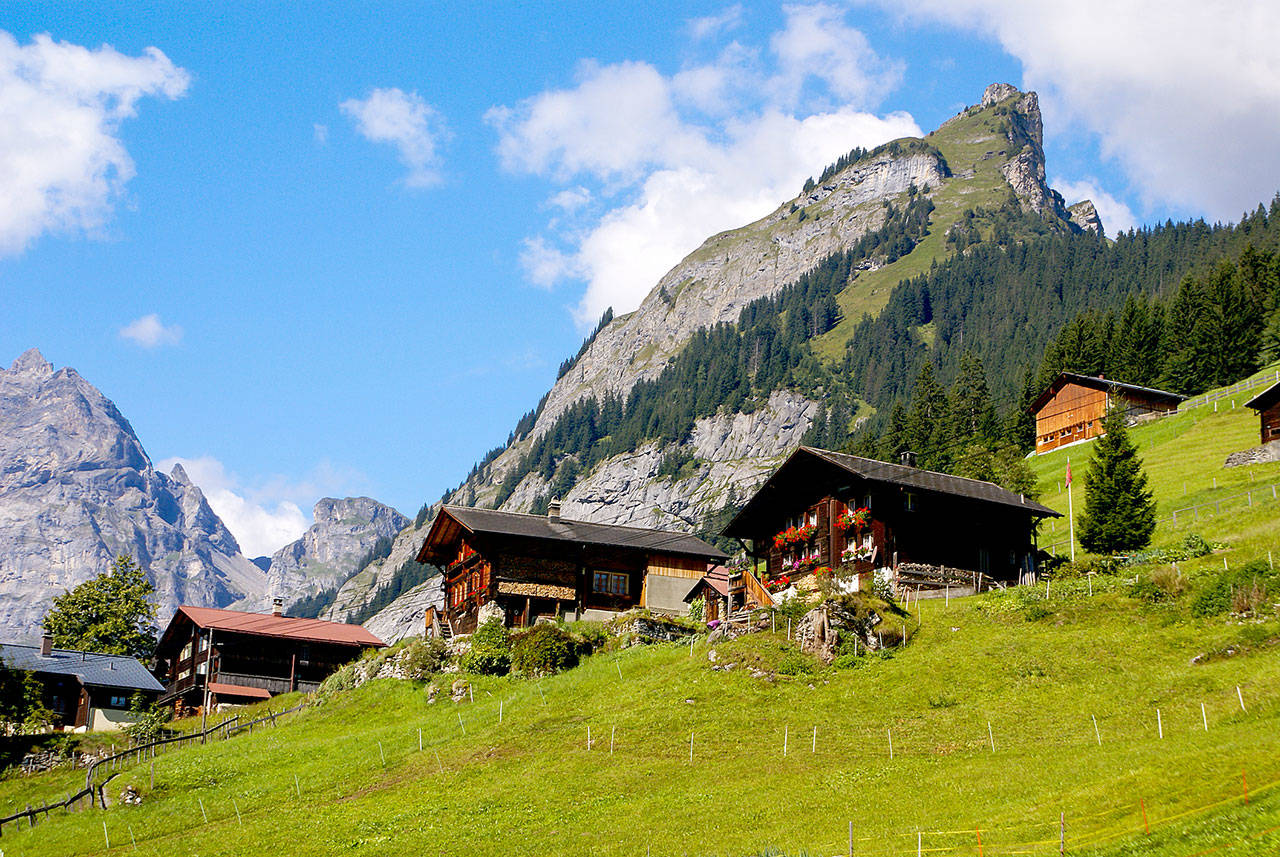As we’ve had to postpone our travels because of the pandemic, I believe a weekly dose of travel dreaming can be good medicine. Here’s one of my favorite European memories from high in the Swiss Alps — a reminder of the fun that awaits us at the other end of this crisis.
On the train heading south from Interlaken into the high country, the Swiss woman sitting across from me asks where I’m going. When I say “Gimmelwald,” she assumes I mean the famous resort in the next valley, and says, “Grindelwald, that’s nice.” When assured that Gimmelwald is my target, she leans forward, widens her eyes, and — with her singsong Swiss German accent — asks, “Und how do you know Gimmelvald?”
Traffic-free Gimmelwald hangs nonchalantly on the edge of a cliff high above the Lauterbrunnen Valley. This sleepy village has more cow troughs than mailboxes. To inhale the Alps and really hold it in, I sleep high, here in Gimmelwald. Poor but pleasantly stuck in the past, the village has a creaky hotel, happy hostel, decent pension and a couple of B&Bs.
Gimmelwald is an ignored station on the cable-car route up to the spectacular mountain peak called the Schilthorn. The village should be built to the hilt. But, led by a visionary schoolmaster, the farming community managed to reclassify its land as an “avalanche zone” — too dangerous for serious building projects. So, while developers gnash their teeth, sturdy peasants continue to milk cows and make hay — enjoying a lifestyle that survives in a modern world only by the grace of a government that subsidizes such poor traditional industries.
Gimmelwald is a community in the rough. When I arrive, I take a quick “welcome back” walk — a tour of the whole town takes about 15 minutes. Its two streets, a 700-year-old zig and zag, are decorated by drying laundry, hand-me-down tricycles and hollowed stumps bursting proudly with geraniums. Grandpas, like white-bearded elves, set aside hand-carved pipes to chop firewood. Children play “barn” instead of “house.” And a little boy parks his toy car next to his dad’s tank-tread mini tractor — necessary for taming this alpine environment. Stones sit like heavy checkers on old rooftops, awaiting nature’s next move. While these stones protect the slate from the violent winter winds, in summer it’s often so quiet that you can hear the cows ripping tufts of grass.
Traditional log-cabin homes line the lanes. Their numbers are not addresses, but fire insurance numbers. The troll-like hut aging near the cable-car station is filled with rounds of Alp cheese, also aging. Small as Gimmelwald is, it still has daily mail service. The postman drops down from neighboring Murren each day (by golf cart in summer, sled in winter) to deliver mail and pick up letters at the communal mailbox. Most Gimmelwalders have one of two last names: von Allmen or Feuz. I’m told that to keep prescriptions and medical records straight, the doctor in nearby Lauterbrunnen goes by birthdate first, then the patient’s name.
Watching two schoolboys kick a soccer ball just a few steps from the cliff’s edge, I enjoy the thought that there’s nothing but air between Gimmelwald and the rock face of the Jungfrau summit directly across the valley. Over there, small avalanches look and sound like distant waterfalls. Village kids have likely learned the hard way: Kick that ball wrong and it ends up a mile below on the Lauterbrunnen Valley floor.
My Gimmelwald walk comes with the sweet smell of freshly cut hay. The townspeople systematically harvest the steep hillside, with entire families cutting and gathering every inch of hay. After harvesting what the scythe can reach, they pull hay from nooks and crannies by hand. Half a day is spent on steep rocks harvesting what a machine could cut in two minutes on a flat field. It’s tradition. For locals, cutting the hay is like breathing … and there’s one right way to do it.
Climbing from zig to zag, I witness a first for me: A farmer at the top of town has filled his big blue tarp with a mountain of hay the size of a small car. Directly below him is his barn with a bridge leading to its loft — the door open like the mouth of a hungry child. Nonchalantly, as if he does this every day, the farmer climbs onto the hay and rides it like a sled steeply down the field to the little bridge where his son awaits. Together, they drag the load into the loft and close the door.
After witnessing that graceful scene of a farmer sharing his mastery of nature with his son, surrounded by all that alpine glory, I think “if heaven isn’t what it’s cracked up to be, send me back to Gimmelwald.”
Rick Steves of Edmonds writes European guidebooks, hosts travel shows on public TV and radio, and organizes European tours. This article was adapted from his new book, “For the Love of Europe.”
Talk to us
> Give us your news tips.
> Send us a letter to the editor.
> More Herald contact information.

























